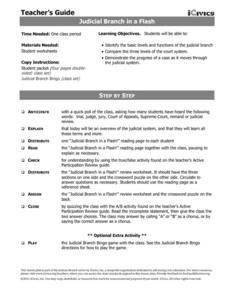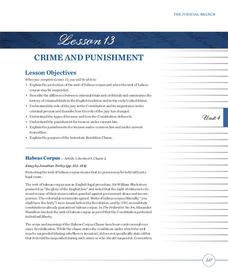Judicial Learning Center
The Judge and the Jury
Unless you are a lawyer, you might not understand just how unrealistic Law and Order and other legal dramas actually are. Here's a great resource to help scholars of criminology gain a more realistic perspective. The lesson outlines the...
iCivics
James Bond in a Honda? Trial Simulation
Your class members will take on the roles of jury members in this exciting simulation. After reading a detailed script and reviewing pieces of evidence, they will determine whether Honda violated copyright and copied James Bond.
Curated OER
Crime Time
Young scholars examine fundamentals of American criminal justice by analyzing each step of the criminal process. They follow the process of a well-known or publicized criminal case in The New York Times, and keep a journal of its...
School Improvement in Maryland
Court Proceedings Civil Cases
What's the difference between civil and criminal law? How do the court proceedings differ in these two types of trials? How do the standards of proof differ? Why do these differences exist? As part of their examination of the...
Curated OER
Lesson 4: The Judiciary: A Brief Introduction to the Courts System
Focusing on the judicial branch of government, the fourth lesson in this series explores the structure of the US courts system. Beginning with an engaging activity based on the short story The Lady or the Tiger, students go on...
Curated OER
The Color of Justice
Learners analyze racism and justice. In this legal system discrimination lesson, students listen to their instructor lecture on disparities in the legal system. Learners respond to discussion questions following the...
Curated OER
Due Process Freedoms
Students participate in a simulation of the voir dire portion of a trial. There are student lawyers assigned for the prosecution and the defense. They must review and question all prospective jurors to obtain a fair and impartial jury.
iCivics
Judicial Branch in a Flash
What is the difference between the federal court and state court systems? What about criminal versus civil cases? Check out this resource that will offer your class members a general and effective overview of the judicial branch in the...
Curated OER
The Jury's Still Out
Students examine the trials and executions of Nicola Sacco and Bartolomeo Vanzetti. In groups, they use the internet to research the impact of the executions in the shape of political cartoons and writings. They discuss an article to...
Curated OER
Fun with Jury Trials
Students take a true or false quiz about jury trials and then gain understanding of interesting facts. It is basically again, an outline that students have as the teacher lectures. The quiz would be for students to remember for further...
Judicial Learning Center
Levels of the Federal Courts
The Supreme Court gets all the glory, but very few federal cases make it to the highest court. An interesting lesson explores the structure of the lower levels of the federal court system. In addition to outlining the organization of...
ConnectED
Crime Scene Investigation
How exactly does a crime scene investigation work? The resource, a unit on criminology, covers everything from the deductive reasoning skills needed for detectives to DNA fingerprinting, all the way to how to gather evidence and bring...
Curated OER
Damilola Taylor: Young people in court
High schoolers read the story, "The scene in the courtroom" then discuss a list of questions. They look at the criminal court system, and design their own user-friendly courtroom.
Curated OER
Government Lesson Plan: Lesson Plan 9
Learners examine and compare/contrast the steps of criminal and civil cases. They define key vocabulary terms, develop an outline of a criminal and civil trial, and analyze the differences in standards of proof in legal cases.
Curated OER
Lesson 5: In the Courtroom: Understanding the Players and the Action
Young lawyers put Goldilocks on trial as they develop an understanding of the legal system in the final lesson plan of this five-part series. After learning about key terms relating to litigation, learners are assigned roles...
State Bar of Texas
Hernandez v. Texas
What if the jury is not made up of people from your ethnicity or background—are they still considered your peers? Scholars analyze the impact the Supreme Court case Hernandez v. Texas had on jury selection across the nation. Paired...
Judicial Learning Center
Getting Ready for Trial
A courtroom can be a scary place for the uninitiated. Get familiar with the process using a helpful overview of the activities that take place prior to both civil and criminal cases. The lesson explains the differences between...
Curated OER
The Leed's footballers' trial
Students explore what happens when someone is tried for a crime. They expand their knowledge of the name "Criminal Justice System" and develop discussion skills. Students read the story Leeds footballer guilty of fighting in public. ...
Curated OER
The Jury System
Students analyze Article III and the Seventh Amendment. In this US Justice lesson, students research the US jury system and complete a Student Jury questionnaire. Students will discuss the impact the implementation of the Jury System had...
Anti-Defamation League
Exploring Solutions to Address Radical Disparity Concerns
The deaths of Michael Brown, Eric Garner, and Tamir Rice, and the protests that followed the 2014 shootings, are the focus of a current-events activity that asks class members to brainstorm and research possible strategies to address the...
Curated OER
Citizen Juries: Zacarias Moussaoui - May 1, 2006
Students consider deliberations by juries. In this citizen jury lesson plan, students complete readings regarding the constitutional right to a trial by jury as well as on the civic responsibility to serve on a jury.
Curated OER
Mock Trial
Young scholars rewrite a traditional fairy tale to represent the viewpoint of the villain. They participate in a mock trial of that villain in which all regular court participants (judge, jury, defendant, witnesses, plaintiff, etc) play...
Curated OER
Mini-Mock Trial
Students read through accounts of a teenage boy's use of a personal watercraft vehicle. They discuss the presented evidence and consider the varying details of the defendant, plaintiff and witnesses. They come to an agreement and state a...
Heritage Foundation
Crime and Punishment
You wouldn't give someone a 10-day timeout for eating a piece of candy. The US government, too, does not believe in unreasonable punishment. A variety of exercises exploring the clauses of the US Constitution prompts class members to...

























